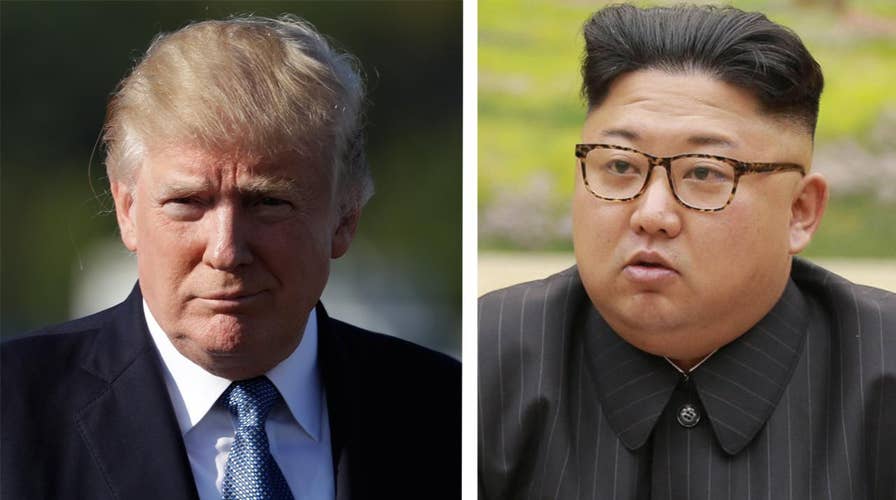Trump appears ready to take military action on North Korea
Former Green Bert Terry Schappert reacts
Editor's note: The following column originally appeared in The Hill and in TheHill.com.
There are no two ways about it.
By saying he is willing to “totally destroy” North Korea to defend the U.S. and its allies, President Trump last week opened the door to possibly launching a pre-emptive military strike, even a nuclear strike.
Did his threat work?
His previous pledge to loose “fire and fury” on North Korea only accelerated the pace of threatening missile launches from “Rocket Man,” as Trump mockingly refers to Kim Jong-Un, the leader of the communist regime.
But in recent weeks, Trump won two unanimous votes in the United Nations Security Council to impose limited sanctions on North Korea. And China has halted its banks from doing business with North Korea.
Early in the year, Trump pressed China to apply even stronger pressure. In July, he admitted to being “very disappointed” with Chinese efforts to cripple Kim’s regime.
Did last week’s speech spur the Chinese to act?
To the contrary, China’s foreign ministry reacted by calling for “restraint” by the U.S.
“Trump’s political chest thumping is unhelpful and it will only push [North Korea] to pursue even riskier policies, because survival of the regime is at stake,” said a column in China’s People’s Daily newspaper.
What about Kim’s response?
The North Korean leader fired back at Trump by calling the president a “mentally deranged U.S. dotard.” That is to say, he dismissed Trump as an elderly, mentally weakened person, and promised to “tame” Trump with “fire.”
At the U.N., there was an equally juvenile put-down of Trump from North Korea’s foreign minister, Ri Yong Ho: “If he was thinking he could scare us with the sound of a dog barking, that’s really a dog dream.”
What about the Russians? Did the speech win new support from them?
“We are witnessing a very dangerous confrontation spiral,” Russia’s foreign minister, Sergei Lavrov, said in response. Lavrov described the exchange between Trump and Kim as “military hysteria” and a foreign affairs “disaster.”
What did Americans think?
Congressional Democrats revived their push to restrain the president’s constitutional war powers.
“The more the president talks about the total destruction of North Korea,” Sen. Edward Markey (D-Mass.) told a reporter, “the more it's necessary for the country and the Congress to have a debate over what the authority of a president is to launch nuclear weapons against another country."
What about American experts on North Korea? What did they think?
“President Trump has handed the North Koreans the sound bite of the century [with this threat to destroy North Korea]. That footage will be used time and time and time again on North Korea’s state television channel,” Marcus Noland of the Peterson Institute for International Economics told a reporter.
Trump’s aggressive handling of North Korea fits into a pattern.
He is similarly bombastic — and similarly non-strategic — in calling the Iran nuclear deal an “embarrassment,” to the U.S.
No other country has joined Trump in expressing regret over the deal. And he has not really explained why it is a bad deal.
In fact, the other nations who signed the deal, as well as the International Atomic Energy Agency (IAEA), have all said Iran is in compliance.
Iranian President Hassan Rouhani fired back at Trump in his own speech to the U.N. General Assembly:
“Ugly, ignorant words were spoken by the US president against the Iranian nation, full of hatred and baseless allegations,” Rouhani said.
The New York Times editorial board noted another problem with Trump’s attack.
“If America withdraws from the agreement, it will outrage the other major powers that are party to the deal — France, Britain, Germany, Russia and China — and give Iran an excuse to resume a full-blown nuclear program.
“Why Mr. Trump would risk that when North Korea’s program is a full-time concern is a mystery,” the Times concluded.
This brings to mind one of Hillary Clinton’s most memorable speeches during last year’s campaign.
She said Trump’s foreign policy “ideas aren’t just different, they are dangerously incoherent. They’re not even really ideas, just a series of bizarre rants, personal feuds and outright lies. This is not someone who should ever have the nuclear codes, because it’s not hard to imagine Donald Trump leading us into a war just because somebody got under his very thin skin.”
Nine months into the Trump’s leadership, the unifying theme of his foreign policy is disrespect for any deal made by President Obama and a lack of core principles to shape his own view of the world.
Trump talks about the importance of putting America first but as the Wall Street Journal editorial page noted there is “no substitute for U.S. leadership… if he wants to build a more peaceful world.”
Political commentator Salena Zito famously wrote last year that journalists took Trump literally during the campaign but not seriously, and that his supporters took him seriously but not literally.
In a political campaign, that worked.
On the world stage with a nuclear crisis escalating, it is scary and possibly deadly.

